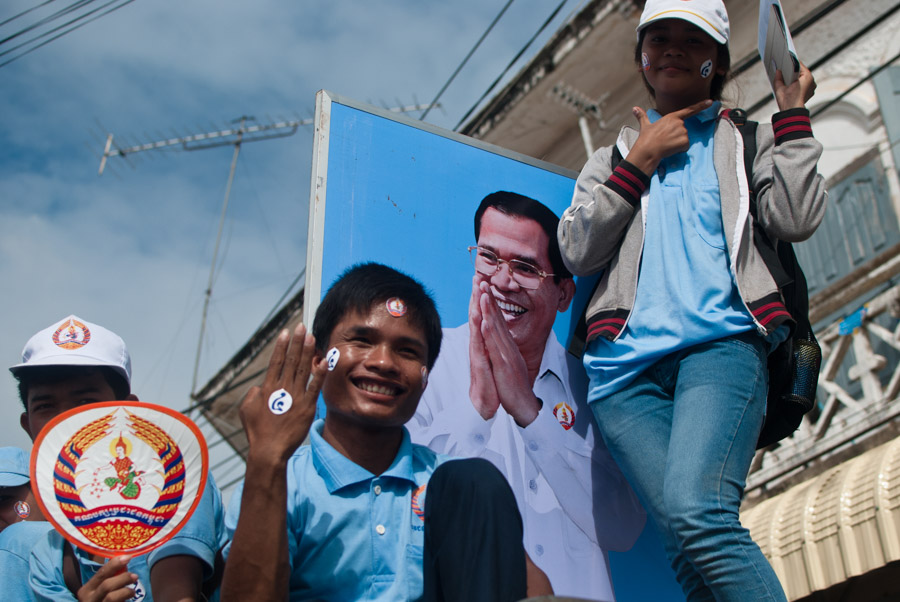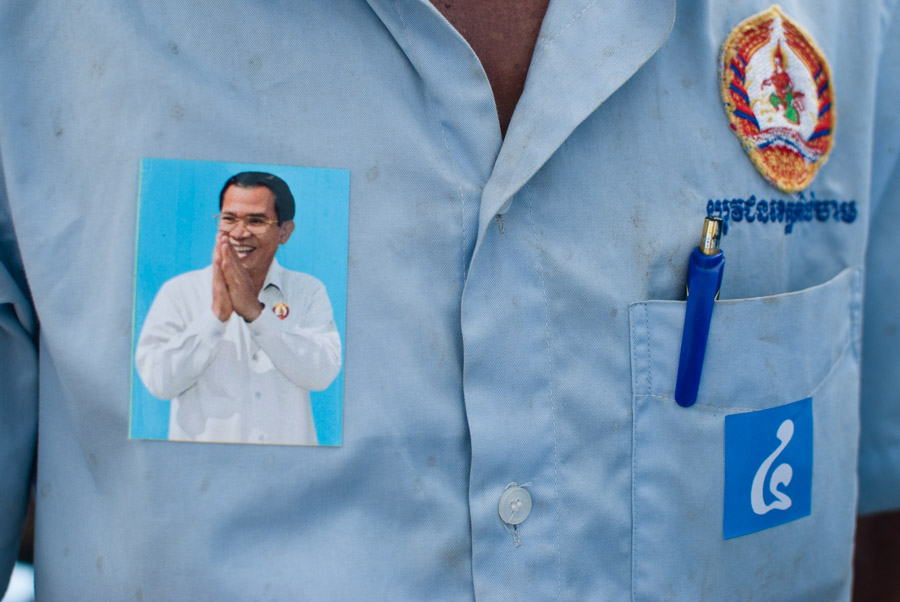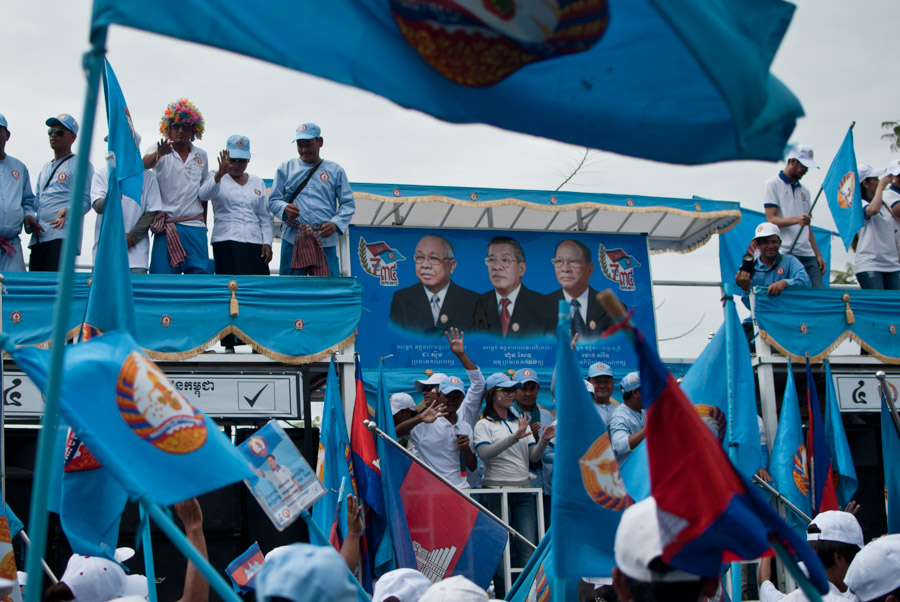An indifferent United States and assertive China have emboldened one of Asia’s longest-serving leaders to embrace outright authoritarianism.
Two weeks ahead of local elections in Cambodia, the country’s long-serving prime minister issued a stern warning to undecided voters. In a May 25 speech that the local Cambodia Daily described as a “mammoth three-hour rant,” Hun Sen accused the main opposition party of plotting a “color revolution” to overthrow the government and said the armed forces stood ready to see off any challenge. Delving into specifics, he then announced that he was willing to “eliminate 100 or 200 people” in order to preserve his party’s hold on power.
Hun Sen has been no stranger to violent rhetoric during his 32 years in power, but such a chillingly specific threat spoke to the depth of his party’s concern ahead of the June 4 elections. Warnings of a destabilizing “color revolution” have become a mainstay of government rhetoric since 2013, when tens of thousands of Cambodians poured into the streets to protest alleged widespread voter fraud at that year’s national election. (The language is taken straight from Chinese media, which regularly scaremonger about “color revolutions,” by which they mean not popular uprisings but illegitimate, foreign-influenced coups.)
While commune elections don’t usually attract much attention outside Cambodia — the poll won’t elect a new government, only local officials in each of the country’s 1,646 communes — a strong showing for the opposition could give it vital momentum heading toward the next national election, scheduled for mid-2018. It could also be the final push for Hun Sen to discard the remaining substance of Cambodian democracy. This reflects the broader retreat of democratic principles in Southeast Asia, a region that has seen serious reverses in Thailand, where a coup brought Gen. Prayuth Chan-ocha to power in 2014, and the Philippines, where a “drug war” waged by President Rodrigo Duterte has claimed more than 8,000 victims. With China eager to back potential autocrats, and the United States in retreat from global affairs and human rights promotion, Hun Sen and others see a chance to solidify power and cast off the troubling trappings of democracy.
In 2012, the Cambodian People’s Party (CPP) won around 60 percent of the vote and gained control of more than 97 percent of commune councils, amid scattered claims of intimidation and flawed voter lists, but hemorrhaged support at the following year’s national election. Then, as now, the main challenger was the Cambodia National Rescue Party (CNRP), which has effectively harnessed the deep public discontent linked to the government land grabs, deforestation, and myriad varieties of corruption that have flourished on Hun Sen’s watch, salting the stew with potent anti-Vietnamese appeals. On a stop during the official two-week campaign period, CNRP President Kem Sokha said his party was primed to win a majority at both upcoming elections, declaring that support for the CNRP was “stronger than at any other time, both in the city and in rural areas.”
The rising opposition poses a potentially existential threat to the CPP, which was installed into power by communist Vietnam after its 1979 overthrow of the murderous Khmer Rouge regime. In the years since, the CPP has repeatedly trumpeted its role in ending Cambodia’s nightmare and depicted itself as the only thing preventing the country from spiraling back into chaos. But that message is increasingly lost on a young generation with little or no experience of the country’s past turmoil and which has become fed up with the lack of opportunities and endemic corruption that has mushroomed under Hun Sen.
“The Cambodian people are ready to go for the election on June 4,” said But Buntenh, a dissident monk who heads the Independent Monk Network for Social Justice, which sits outside the official, CPP-controlled Buddhist hierarchy. “Most of them think this is a time to change to a real democracy.”
While political crackdowns are seasonal events in Cambodian politics, usually coinciding with the electoral cycle, the current repressive phase has gone further than at any time since the mid-1990s.
But whether Asia’s longest-serving autocrat will allow even the possibility of change is another question. Hun Sen’s threats carry weight. Twenty years ago next month, Hun Sen’s forces launched a lightning strike against his royalist rival and coalition partner, Prince Norodom Ranariddh, murdering many of his key commanders. Human Rights Watch, a longtime nemesis of the Cambodian leader, claims that more than 300 people have been killed in politically motivated attacks since 1991. In that time, Hun Sen has ruled Cambodia through guile and manipulation, underpinned by a supple form of patron-client politics that has bound him closely to a mesh of loyal political, military, and business elites.
In 2013, reeling from the CPP’s loss of support, Hun Sen promised reforms. He reshuffled his cabinet (twice) and announced wage hikes for soldiers, teachers, and garment workers. He pledged to wipe out illegal logging and timber smuggling. After being caught out by the CNRP’s use of social media in 2013, the 64-year-old strongman even became an avid convert to Facebook, using it to soften his belligerent public persona and project a more responsive, populist image to the public.
At the same time, the government has launched an unprecedented political crackdown. Over the past two years, it has arrested a wide array of individuals including two opposition senators, a prominent land rights activist, and a group of staffers from the Cambodian human rights organization ADHOC. (Another local human rights group puts the current count of political prisoners at 25.) In February, the government tweaked political party rules to give the courts the power to abolish political parties on a range of vague pretenses, a move that forced exiled longtime opposition leader Sam Rainsy to resign as president of the CNRP. Kem Sokha, who took over the top CNRP job in March, was also targeted last year by a “sex scandal” involving a young hairdresser, leaked phone conversations, and confected allegations of witness tampering. In July 2016, this political sparring reached a horrific climax with the killing of Kem Ley, a grassroots political organizer, who was gunned down at a Phnom Penh petrol station and has since become an icon of opposition to CPP rule.
Phay Siphan, a spokesman for the Council of Ministers, as Cambodia’s cabinet is known, denied any political motive to the recent arrests, saying that those in jail had simply violated the law. He also said Hun Sen’s threats had been blown out of proportion by the foreign press and accused the CNRP of campaigning to “incite the people against CPP members.”
While political crackdowns are seasonal events in Cambodian politics, usually coinciding with the electoral cycle, the current repressive phase has gone further than at any time since the mid-1990s. “They seem more draconian, sinister, and clever than usual,” said Sophal Ear, the author of Aid Dependence in Cambodia: How Foreign Assistance Undermines Democracy. “I guess the message is: If you can’t beat them, dissolve them.”
Former opposition leader Sam Rainsy said in this context there was no way the upcoming election could be seen as even minimally free and fair and called on the United States and Western governments to stand up for democratic principles. “Only the prospect of international isolation can push Hun Sen to reverse his authoritarian drift and to show more respect for democratic rules and principles,” Sam Rainsy said in an email.
Cambodia’s autocratic turn has been aided by the decline of Western leverage as Chinese power has risen in the region. Over the past two decades, Hun Sen has been one of the greatest beneficiaries of China’s economic and political emergence, receiving billions of dollars in soft loans and infrastructure funding. Cambodia has been an enthusiastic participant in China’s new Asian Infrastructure Investment Bank, and when Chinese President Xi Jinping presided over last month’s showcase Belt and Road Forum in Beijing, Hun Sen was among the 28 world leaders in attendance.
In return for Chinese support, the Cambodian government has supported Beijing’s position on a range of issues, including China’s contentious claims in the South China Sea. The Cambodian government has even started promoting a Khmer-language edition of Xi’s doorstopper, The Governance of China.
The long-term effect of Chinese backing has been to effectively mark an end to the era inaugurated by the 1991 Paris Peace Agreements, which created the country’s current democratic political system, and the subsequent United Nations peacekeeping mission that presided over landmark elections in 1993. While Cambodian democracy has always been shallow, a side effect is that the country’s political space has been subject to close scrutiny by Western governments, international development agencies, human rights monitors, and a bevy of local civil society groups, many of them supported by foreign donor funding.
China’s aggressive strategic push has been matched by the apparent retreat of U.S. influence under President Donald Trump.
Foreign scrutiny has produced a seesawing political climate, in which periods of repression have alternated with phases of relative freedom, carefully calibrated to maintain the support of traditional aid donors like the United States, Australia, and the European Union. Now, with domestic support rising and Beijing offering an escape hatch from Western pressure to improve governance and respect for human rights, Hun Sen has the ability to make the current crackdown a more permanent feature of the Cambodian political landscape.
As elsewhere in Southeast Asia, China’s aggressive strategic push has been matched by the apparent retreat of U.S. influence under President Donald Trump. As if to preempt American criticisms of the upcoming election, the Cambodian government has taken recent steps to unilaterally downgrade its relationship with Washington, canceling a planned bilateral military exercise and kicking out a U.S. naval engineering battalion that was building schools and maternity wards. In April, the Cambodian Foreign Ministry issued an 11-page “white paper” defending its record and slamming Western governments for colluding with nongovernmental organizations and media outlets that have “twisted historical facts and events in an attempt to portray a negative image of Cambodia”—another distinct echo of China, which regularly publishes such “white papers” lauding its own human rights and attacking the West. Lao Mong Hay, a human rights activist and longtime critic of Hun Sen’s government, said the prime minister was unlikely to give up power willingly, unless he suffered a “big defeat” at the 2018 election.
Even if the aging Cambodian leader survives these elections without a repeat of past events, it will not resolve the contradiction at the heart of Cambodia’s political system: that true reform would undermine the powerful interests that have propped up the CPP for so long. One way or another, Hun Sen will have to find ways to address the rising expectations of a young, connected, and increasingly demanding population. “He’s been in power 32 years. His party has been in power 38 years,” Sophal Ear said. “At some point, things change whether you want them to or not.”
Published by Foreign Policy, June 2, 2017






